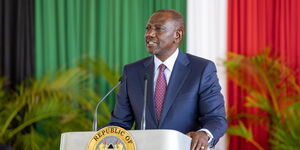President William Ruto has signed into law two major pieces of legislation aimed at strengthening the country's financial sector: the Insurance Professionals Bill and the Anti-Money Laundering and Countering the Financing of Terrorism (Amendment) Bill, 2025.
The New Insurance Professionals Act aims to professionalise the industry by introducing stringent qualifications, licensing standards, and disciplinary mechanisms for insurance practitioners. It is expected to weed out quacks, enhance public trust in the insurance sector, and align Kenya’s practices with global standards.
Under the new law, insurance professionals will be required to register with a central regulatory authority, undergo continuous professional development, and adhere to a code of ethics. Violators could face deregistration, fines, or even criminal charges, depending on the severity of the misconduct.
In tandem, the Anti-Money Laundering and Combating of Terrorism Financing (Amendment) Act 2025 is designed to seal legal loopholes that previously enabled criminals to exploit Kenya’s financial and real estate systems.
Among the key changes are tighter controls over property transactions, increased scrutiny of beneficial ownership of shell companies, and expanded reporting obligations for financial institutions. The law also empowers enforcement agencies to freeze or seize suspicious assets faster.
The government hopes that these reforms will not only stem illicit financial flows but also boost Kenya’s reputation in the eyes of global regulators such as the Financial Action Task Force (FATF), which monitors compliance with international AML/CFT standards.
In a statement shared after the signing ceremony at State House, President Ruto pointed to his administration’s commitment to transforming Kenya into a regional leader in financial transparency and regulatory enforcement.
"Kenya is keen on pursuing reforms that cement our position in the region as a leader in financial integrity and regulatory reform," Ruto stated.
The developments come after the European Commission placed Kenya in its updated list of high-risk jurisdictions presenting strategic deficiencies in their national anti-money laundering and countering the financing of terrorism regimes.
The commission said in a statement on June 10 that it had added a number of third-country jurisdictions to its list, including Algeria, Angola, Côte d'Ivoire, Kenya, Laos, Lebanon, Monaco, Namibia, Nepal and Venezuela.
The report meant that Kenya and the affected countries had now been entered into the blacklist of the list of countries subject to extra monitoring of their money laundering controls.
Meanwhile, Kenya’s Financial Reporting Centre has intensified the monitoring of suspicious financial transactions. The FRC has also expanded its scope of work with reporting institutions—especially banks, insurance firms, Saccos, and forex bureaus—through real-time transaction monitoring and enhanced due diligence protocols.












